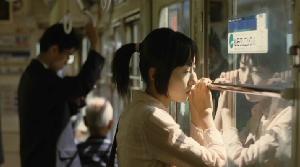
Café Lumière (Hou Hsiao-hsien, 2003)
Japanese Title: Kôhî jikô
Hou Hsiao-hsien's Café Lumière, his tribute to the great Japanese director Yasujiro Ozu, ends with a spectacular image, trains criss-crossing each other. It's spectacular because it is so simple yet undeniably powerful: those noisy transportation vehicles chugging along in their sure paths all at the same time and in the same frame. Despite these trains' existence in that exact moment of time in that contained space of cinematographer Lee Pin Bing's frame, it seems that each of the train is not aware of the other's existence.
Like the trains are the characters in this Hou film, curiously opaque in their dealings with others and unable to relate emotionally. Yoko (Yo Hitoto) has just returned from Taiwan and is now in Japan researching about Taiwanese composer Jiang Wen-ye, who spent some years in Japan, even marrying a Japanese girl who he would later on abandon forever. Helping her is bookshop owner Hajime (Tadanobu Asano) whose hobby is to record the sounds of trains. There seems to be something going on between the two of them; something more than just mere companionship and less than a romantic relationship.
When Yoko arrives in Japan, the first in her to-call list is the geeky Hajime and while everyone (including her parents) gets a Taiwanese umbrella, Hajime's present is an expensive looking pocket watch (commemorating the anniversary of the building of the railways in Taiwan). Within the deliberate blurring of Yoko and Hajime's relationship is the preoccupation to discover the existence of the cafe Jiang Wen-ye frequented, a pastime that feels like the lifetime of their relationship. When the search ends, their trains depart from each other (not without a final visit; again, a rather opaque visit to a sick friend, than a burst of emotionality). Again, it is summed up in a beautiful scene: two disconnected trains meet up in a moment of time in the same tight frame. On one train is Yoko, and the other is Hajime unaware of each other's existence in those disconnected trains.
Then there's Yoko's relationship with her stepparents. After visiting Hajime in his shop, she visits her parents in their home and announces that she is pregnant to a Taiwanese student. This is Hou in his most Ozu-like. The blocking, the tatami-shots (low angle shots, just below the head), the hefty air of familial conflict that pervades the space that separates the characters. There's an undeniable tension that erupts when Yoko, and her parents are at the same frame: the silent and clearly disappointed father, the overly maternal stepmother, and the daughter who has distanced herself quite considerably from her family.
Ozu is clearly the most Japanese of all the Japanese directors. His films, despite their universal themes, depict a certain visual appeal that sits very well with Japanese culture. His style is relaxed, deliberately meditative, and conscious of the little patterns and routines. It can be argued that Hou's style is comparable to Ozu's. However, Hou's themes are distinctly Taiwanese or implicitly universal. In Café Lumière, Hou removes himself from the language and the familiar locales and its rich history that he's been so good with. The result is not always perfect. Hou's pacing is so painstakingly detailed, his characters so disconnected with the world, the story so slight, that the film feels inconsequential. Then Hou creates these beautiful images, like the final scene, that suddenly wakes me up from a near-slumber that the filmed inaction almost lured me to.







wm.jpg)































No comments:
Post a Comment